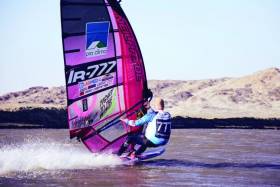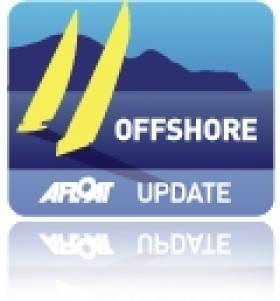Displaying items by tag: Speedsailing
Oisin Van Gelderen is Sailor of the Month (Speed Sailing) for November
The annual November visits of Skerries windsurfer Oisin van Gelderen to the Luderitz Speed Canal in the Namibian desert in southern Africa continue to fascinate Irish sailors as he battles to achieve a sustained speed above 50 knots. He has broken the 50 knots barrier in short bursts, and did it again in November 2019, briefly registering 51.7 knots. His GPS for the course showed 49.66 knots - still a third of a knot short of the magic 50, but he continues to be Ireland’s fastest sailor.
#roundirelandspeedrecord – With arguably the hardest part of the 700–mile journey already over, the northabout Oman Sail Trimaran is 75–miles off the Sligo/Mayo coast and on target to break the Round Ireland Speed Sailing record of one day and 20 hours. Having covered 300 nautical miles in 19–hours, the fastest part of this voyage is yet to come.
The six man crew were heading in a southerly direction (190 degrees) just before noon, expecting to crack sheets and accelerate down the west coast in some forecasted big winds, ready to reach estimated speeds of over 30–knots before the Fastnet rock.
Leopard 3 Breaks Own 24-Hour Speed Record
The 100ft Canting Keel Maxi Leopard 3 has broken its own record for a 24-hour run, covering 495 nautical miles. The previous record stood at 466.4NM.
The record is in a special category for craft with powered winches, and doesn't come close to some of the other records on boats where humans work the lines by hand.
The monohull record outright is still held by Torben Grael's Ericsson 4 team who covered 596.6nm at an average speed of 24.85 knots during the last Volvo Ocean Race.
Frenchman Thomas Coville blasted through 628.5 nautical miles in 24 hours on his 105ft trimaran Sodebo, averaging 26.2 knots in the process.
But the absolute mac daddy of them all is held by Pascal Bidegorry in his monstrous 131ft trimaran Banque Populaire 5. Bidegorry travelled 908.2 nautical miles in one day, and with an average of 37.84 knots you can only imagine what his top speed was.
The World Sailing Speed Record Council announces the ratification of a new World Record for ICAP Leopard.
Record: Monohull. 24 hours under rule 21.c
Yacht: ICAP Leopard. 100ft Monohull
Name: Mike Slade and 20 crew
Dates: 31st May to the 1st June 2010.
Start time: 05.00; 31/05/10
Finish time: 05.00; 01/06/10
Elapsed time: 24 hours
Distance: 495.1 NM
Average speed: 20.6 kts
Comments: Previous record: 466.4nm 19.4 kts. May 08 Leopard. Mike Slade GBR


























































